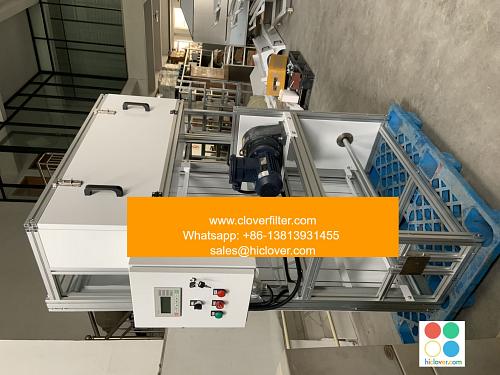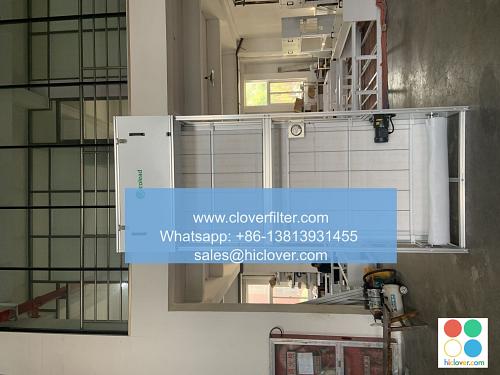The Benefits of Upgrading to Automatic Roll Air Filters in Electronics Packaging Plants

In the realm of electronics packaging, maintaining a clean and controlled environment is paramount to ensure the quality and reliability of the final products. One crucial aspect of achieving this cleanliness is the use of air filtration systems. Among the various types of air filters available, automatic roll air filters have emerged as a preferred choice for many electronics packaging plants due to their numerous benefits. This article delves into the advantages of upgrading to automatic roll air filters, highlighting their impact on productivity, cost savings, and product quality.
One of the primary benefits of automatic roll air filters is their ability to maintain a consistent level of air cleanliness. Traditional filter systems often require manual intervention for replacement or cleaning, which can lead to fluctuations in air quality. In contrast, automatic roll air filters continuously supply clean air by automatically advancing a new section of filter media as the old one becomes saturated. This ensures that the air quality within the packaging plant remains consistently high, reducing the risk of contamination and damage to sensitive electronic components.
Another significant advantage of automatic roll air filters is their potential for cost savings. While the initial investment in an automatic roll air filter system may be higher than that of traditional systems, the long-term benefits can lead to considerable savings. For instance, the continuous operation and minimal need for manual maintenance reduce labor costs associated with filter replacements and cleaning. Moreover, the consistent air quality provided by these systems can lead to a reduction in product defects and failures, further decreasing costs related to rework and waste.
From an operational perspective, automatic roll air filters offer increased efficiency and flexibility. They are designed to operate without significant interruption, allowing packaging plants to maintain continuous production cycles without downtime for filter maintenance. This is particularly beneficial in high-volume production environments where any halt in production can lead to significant losses. Additionally, these systems can be easily integrated into existing air handling systems, making them a versatile solution for plants looking to upgrade their air filtration capabilities.
The use of automatic roll air filters also contributes to a safer working environment. By efficiently removing airborne contaminants, these systems reduce the exposure of workers to harmful particles and gases, which can cause respiratory issues and other health problems. Furthermore, the automatic nature of these filters reduces the direct handling of filter media by personnel, minimizing the risk of skin irritation or other adverse reactions that can occur from contact with certain filter materials.
In terms of maintenance, automatic roll air filters are relatively simple to manage. They are equipped with indicators that signal when the filter media needs to be replaced, ensuring that maintenance tasks are performed on an as-needed basis rather than according to a fixed schedule. This approach prevents unnecessary maintenance activities, further optimizing resource allocation within the plant.
Conclusion:
In conclusion, upgrading to automatic roll air filters presents a multitude of benefits for electronics packaging plants. From enhancing product quality and reliability, to reducing operational costs and promoting a safer working environment, these systems are a valuable investment for any facility seeking to improve its air filtration capabilities. As the electronics industry continues to evolve, with products becoming increasingly sophisticated and sensitive to environmental conditions, the importance of high-quality air filtration will only continue to grow. By adopting automatic roll air filters, packaging plants can position themselves at the forefront of quality and efficiency, ensuring their competitiveness in a rapidly advancing market.
FAQs:
- What are the primary advantages of automatic roll air filters over traditional filter systems? The primary advantages include consistent air quality, cost savings, increased efficiency, and a safer working environment.
- How do automatic roll air filters contribute to cost savings? They contribute to cost savings through reduced labor costs for maintenance, decreased product defects, and lower costs associated with rework and waste.
- Are automatic roll air filters easy to integrate into existing systems? Yes, they are designed to be easily integrated into existing air handling systems, making them a versatile solution for plants looking to upgrade their air filtration capabilities.
- What indicators are used to signal the need for filter media replacement in automatic roll air filters? These systems are equipped with indicators that signal when the filter media needs to be replaced, ensuring maintenance is performed on an as-needed basis.
- How do automatic roll air filters impact the safety of the working environment? They reduce workers’ exposure to airborne contaminants, minimize direct handling of potentially irritating filter materials, and contribute to a cleaner and healthier environment.


